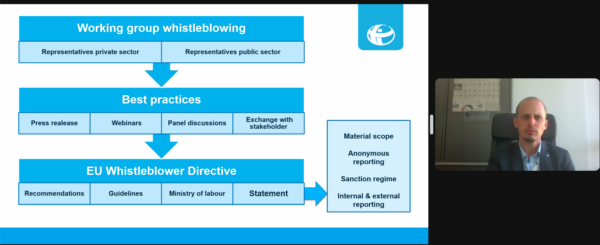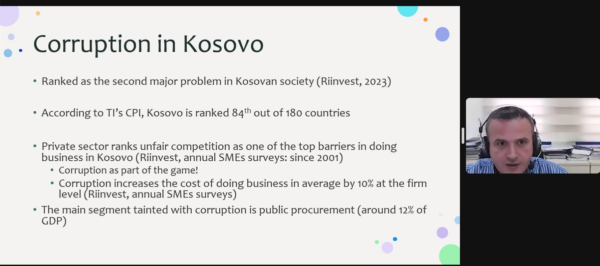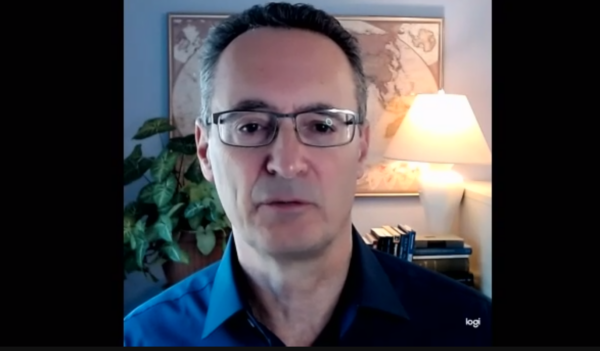16 October 2023 –
The need to engage the private sector in the fight against corruption was repeatedly raised at the UNCAC Coalition’s Global Coalition Conference (GCC) held in June 2023. Several participants spoke about enhancing business ethics and changing corporate behavior when discussing issues such as integrity in political financing and public procurement, beneficial ownership transparency, or whistleblower protection. As civil society organizations, we recognize that advancing anti-corruption objectives requires the active contribution of the business sector, but we do not necessarily know where to start, how to connect and leverage the United Nations Convention against Corruption (UNCAC) with private actors.
At the 9th Regional Meeting for Europe, the United States and Canada held on October 3, more than 30 participants discussed the engagement of the private sector in anti-corruption efforts. We learned from projects and initiatives targeting the private sector and discussed the role, expectations and potential impact of civil society when seeking to involve private actors in UNCAC bodies and processes. Although several members and affiliates to the UNCAC Coalition have business integrity as a focus, the meeting marked the first collective reflection for the Europe network on that topic and on ways to bring the business sector closer to our advocacy objectives.
Not only to governments: the UNCAC matters to the private sector as well
When we analyze corruption, the private sector is frequently perceived as causing the problem, but it is also an essential part of the solution. All areas in society including businesses are affected by corrupt environments. Small and medium-size entreprises (SMEs) are more prone to offering bribes to secure public contracts, thereby excluding others acting with integrity. This is why companies of this size, which compose the largest part of the economy, benefit the most from transparency and fair competition as they increase their opportunities to participate in public tenders. At the other end of the spectrum, foreign bribery involving multinationals has devastating effects on economies and people, yet these companies can drive responsible business conduct throughout global supply chains. Within the private sector, professional enablers are crucial actors in transnational corruption and tax evasion operations – the lawyers, accountants and other service providers who facilitate financial transactions to different jurisdictions, help set up shell companies and complex legal structures for the criminals, and put at risk some sectors such as real estate by misusing it for money laundering.
Against this background, we began the Regional Meeting by recalling that the UNCAC has the unique potential to create an environment where businesses can thrive, operate and compete fairly (Civil Society Guide: UNCAC and the private sector, published by Transparency International and UNCAC Coalition). The UNCAC embodies a comprehensive approach to corruption including preventive and punitive measures and covers both private-to-public and private-to-private relationships; it imposes obligations on governments but has also direct implications for private actors.
Article 12 under the Convention’s Chapter II on prevention is fully dedicated to the private sector and establishes measures that States have to take to prevent corruption involving the private sector and to enhance accounting and auditing standards. However, each of the other major areas of the UNCAC also affects the private sector in one way or another. Article 26 (Chapter III on criminalization and law enforcement) establishes the responsibility of legal persons for acts of corruption and makes them subject to sanctions, article 39 (Chapter III) requires private entities to cooperate with judiciary authorities and financial institutions to enhance scrutiny over high-risk clients (article 52, Chapter V on asset recovery). Article 46 (Chapter IV on international cooperation) affords for mutual legal assistance concerning legal persons, (article 60, Chapter VI on technical assistance and information exchange) foresees training regarding the private sector.
We then turned, through concrete examples in three different contexts, to address questions such as how to incentivize companies and individuals to commit to clean business and be aware of UNCAC provisions, and what approaches and tools we as civil society can use to gain more support from the private sector to anti-corruption advocacy goals.
Using expertise from the private sector to inform anti-corruption advocacy
The first experience was shared by Luca Mak, Executive Director of Transparency International Austria (TI Austria), who explained how their working group on whistleblowing became instrumental in the organization’s advocacy for effective whistleblower protection legislation. TI Austria has corporate members taking active part in different thematic working groups. The group on whistleblowing was established in 2016, before any whistleblowing law existed, around a core group of 20 experts including private and public sector representatives.
The adoption of the European Union Directive in 2019 provided the working group with a new, concrete objective. Steered by its dedicated members, TI Austria began by raising awareness through press releases presenting new opportunities to use whistleblowing mechanisms as an essential tool in the fight against corruption and highlighting the importance of granting legal protection to those reporting corruption. The context was adverse given the bad reputation of whistleblowers and widespread fear that people would abuse the system and blow the whistle on co-workers. TI Austria worked to change that narrative, improve the image and the understanding of whistleblowers’ role in society, and insist on the opportunities of strong legislation. At the same time, they built capacity internally through webinars and meetings held nearly fortnightly. They also exchanged with stakeholders such as political parties and the Ministry of Labor –responsible for transposing the EU Directive–, and organized events and panel discussions with institutions with experience on the topic, such as the Austrian Federal Competition Authority. They also benefited from international insights from other Transparency International Chapters around Europe.
However, realizing that private sector professionals involved in TI Austria’s work were more experienced in terms of whistleblower protection and reporting channels than those from the public sector was a turning point in the advocacy strategy. TI Austria then moved up a gear and decided to formulate a statement and concrete recommendations while the law was being drafted. It was a big project for the whistleblowing working group, composed by mostly business experts who joined forces voluntarily. Other companies and several ministries got in touch with TI Austria to hear their diagnosis and understand why they were pushing so hard for an effective whistleblower protection law, and what its benefits would be. Work bore fruit when TI Austria presented a strong statement and recommendations to the Ministry of Labor and the Parliament, based on years of first-hand experience from the business sector.

In terms of results, Luca considered that TI Austria succeeded to some degree as a law was adopted in February 2023. After consultations with TI Austria, the final law improved the draft on aspects such as internal and external reporting channels. It is a good example of how private sector expertise can be used to improve regulations. However, the material scope of the law is very narrow and the system of sanctions is inadequate. There will be a further opportunity to influence this law when it is evaluated in three years. TI Austria is one of the only organizations working in the anti-corruption field in the country and is now well-positioned to advocate for improvements.
Empowering business associations to combat supply-side corruption
In the second presentation, Alban Hashani, Executive Director of Riinvest explained how the institute works with the private sector on different fronts and what have been their achievements so far. In Kosovo, corruption is viewed as a major problem in society, including by the private sector. Through a series of annual surveys to SMEs, Riinvest collected data over the years revealing that the cost of corruption in public procurement and unfair competition rank high on the list of barriers distorting the business environment. Many businesses perceive corruption as part of the game, as a structural problem.
Building on this data, Riinvest undertook a study to understand what makes companies offer bribes and advantages to obtain public contracts and favors. They analyzed the so-called “supply side” of corruption, often identified with the private sector, and published a report in 2019 explaining the existing legal gaps and institutional shortcomings that fueled corruption, from a business perspective.

Their next step was to gauge interest from the private sector to create and implement an anti-corruption program. With over two-thirds of businesses in Kosovo considering that involvement in corruption tarnishes their reputation and expressing willingness to implement ethics principles, Riinvest opted for an intervention targeting business associations. In consultation with business associations and with businesses from all regions of Kosovo, Riinvest elaborated an anti-corruption business code and proposed its signature to different organizations. The code aims at streamlining anti-corruption measures into business practice: adhering associations must incorporate its provisions in their membership application process and commit not to represent any company that engages in corrupt activites and violates this code. Individual companies are requested to develop policies and procedures to raise integrity standards and introduce bribery reporting systems.
With six significant business membership organizations in Kosovo signing the anti-corruption business code, Riinvest succeeded in creating a coalition of business associations including the prominent Kosovo Chamber of Commerce, the American Chamber of Commerce, the German Chamber of Commerce, and Kosovo Producers’ Club which mainly deals with manufacturing.
The current challenge, according to Alban, is that of implementing the code in practice. The coalition has a steering committee, and each signatory association is now establishing its own secretariat. Riinvest is collaborating to draft guidelines and rules of procedures for the secretariats of the coalition, while they plan a communications strategy including awareness-raising campaigns, “naming and shaming” those not complying with the code to trigger reputation sanctions and promote success stories.
Transparency in the real estate sector to address money laundering
Moving to a different context, Tom Cardamone, President and CEO of Global Financial Integrity (GFI), presented how his organization works in the United States (USA) to raise awareness on the role of professional enablers of corruption and to fight for higher transparency and controls in the real estate sector.

In 2021, GFI published the report “Acres of Money Laundering” which shed light on how easy it is to launder money through the real estate sector. The study analyzed 56 cases of money laundering through real estate in the USA in a five year period, 2015-2020. Close to 2.3 billion USD was laundered in those 56 cases, over 80% of them involved a shell company, 80% of the money invested came from outside the country, and half of the cases involved Politically Exposed Persons (PEPs). Significantly, the USA is the only G7 country that does not require real estate professionals to comply with anti-money laundering laws and regulations.
In fact, the misuse of real estate for money laundering has been a well-known problem to the US administration for a long time. As Tom reported, in 2002 the Treasury Department suggested that real estate operators should fulfill anti-money laundering reporting obligations, but gave them a ‘temporary exemption’ which has never been removed since. More recently, during the evaluation carried out by the Financial Action Task Force (FATF) in 2016, the real estate sector was highlighted as a major risk area in the USA. Following the FATF recommendation, the Treasury Department introduced Geographic Targeting Orders (GTOs) which focused on residential real estate markets and the cash purchase by anonymous companies of high-value properties likely to be used to launder money. Although initial geographic reach has been expanded, GTOs have left the majority of the country open to potential money laundering through real estate.
In 2020, the US Congress passed the Anti-Money Laundering Act, directing the Treasury Department to produce a rule targeting the real estate industry, in line with obligations for banks and financial institutions. Three years later, it is foreseen that a new regulation will require the real estate industry to report the identities of the beneficial owners of companies buying real estate in cash nationwide to the Treasury’s Financial Crimes Enforcement Network (FinCEN), before the end of 2023. Besides, the Corporate Transparency Act entering into force on January 1, 2024 and requiring many companies to report information about their entity and their beneficial owners will to some extent impact on the real estate sector.
GFI’s report and findings about money laundering through real estate remain a persuasive tool when talking to industry actors about this issue. As Tom pointed out, it often happens that real estate professionals lack awareness of the risks of their activity: they might just see wealthy individuals investing in their community. Therefore, based on evidence, GFI dedicates resources to educating real estate actors on anti-corruption terminology, their risks and obligations, comparing the situation to other countries and highlighting that the new reporting requirement in the USA might in fact not be overly complex or onerous. As Tom concluded, understanding their obligations is the first step for the industry to increase its compliance with them.
Monitoring private sector commitments and leveraging the next UNCAC Conference of the States Parties for advocacy
We ended the session with interesting questions to the speakers on issues such as how to maintain civil society independence when collaborating with the private sector, how to monitor private sector commitments, how to build the business case for integrity in public procurement in particular, and what opportunities for advocacy and communications the forthcoming 10th UNCAC Conference of the States Parties (CoSP10), to be celebrated in the United States at the end of the year, will offer.
As we saw, civil society organizations can take different approaches and carry out a variety of projects to engage with the private sector, from research-based awareness-raising and education, to using private sector expertise for more targeted advocacy, and to convening coalitions, breaking silos and creating cross-sector platforms for discussion. In any case, civil society’s independence and credibility can be ensured through working with a diversity of experts not only from the private sector, and conveying agreed, clear messages with a constructive approach.
The question of how to ensure compliance with the commitments made by private sector actors was considered key. Luca Mak responded that monitoring private sector commitments is essential as is monitoring the effectiveness of legislation. In the case of whistleblowing, leveraging data and evidence from public and private sources, especially from other countries, leads to better advocacy for anonymous reporting. In the case of Kosovo’s business anti-corruption code, Alban Hashani made the point that their two-step strategy was intentional: first, adopting the code, second, establishing a monitoring mechanism. This is the task they have ahead of them over the next year, including agreeing on a timeline for assessments and reporting, and on periodic audits, by external auditors, to see how associations are adhering to commitments and policy.
The issue of public procurement was addressed as it is expected that the Conference of the States Parties (CoSP10) adopts a specific resolution on public procurement. Kristen Robinson from the Open Contracting Partnership (OCP) reported on how they are advocating ahead of the CoSP for transparency around procurement. She also explained how they build the case for companies and for governments, focusing on incentives and health of the market rather than threatening stakeholders. To governments, OCP argues that higher competition will save public funds. Suppliers are often interested in forecasting data from greater transparency as it helps them predict what bids to apply for. It is also important to have a complaints or dispute mechanism that gives companies the reassurance that they will be protected if they act with integrity.
Finally, on how we can use the UNCAC CoSP in the USA more generally to elevate and advance private sector involvement in anti-corruption and the UNCAC, Tom Cardamone pointed to making the most of media and social media opportunities. For instance, the platform TikTok contains a number of recordings discussing the Corporate Transparency Act. Precisely in the USA, we need to show that corruption is not only an external issue, as is mostly perceived, but an internal problem as well, explain how it works and make connections with the real impact of corruption. For instance, civil society organizations can share stories to illustrate how oligarchs and organized crime groups from other countries use the US financial system and real estate sector to launder the proceeds of their criminal activity. Sharing these stories through all forms of media, especially social media, can be a key factor in bolstering resolutions coming out of the CoSP.
Resources
Civil Society Guide: UNCAC and the private sector, Transparency International and UNCAC Coalition (2013)
Supply-side of corruption from a business perspective, Riinvest (2019)
Acres of Money Laundering: Why U.S. Real Estate is a Kleptocrat’s Dream, Global Financial Integrity (2021).
Guide: Importance of the private sector in the implementation of UNCAC in Southeast Europe, Macedonian Centre for International Cooperation (MCIC) and UNODC Civil Society Unit (2023, pending publication)
The guide aims at making UNCAC more relatable to the private sector. It emphasizes the role of the private sector as a relevant stakeholder in UNCAC implementation and shows how companies can connect their everyday work with this Convention, with examples of corporate initiatives from different countries in the region.
_____________________



